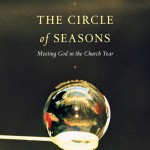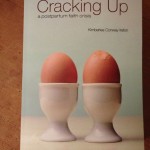I wrote this in mid-October, friends, while we were in temporary housing before we moved into our beautiful new home…which, alas, did not have internet access for nearly a month. We are now internet-enabled, so at long last, I’m back to my blog. It’s been good to be away, but it’s better to be back.
Before we moved last month, I received a small package from The Rabbit Room. Inside was a copy of Jonathan Rogers’s newly re-released book The World According to Narnia, from which I’d read an excerpt back in August and then promptly ordered. Any book that discusses moral imagination and narrative theology, even if it doesn’t use those terms (and this one doesn’t), lands itself on my to-read list.
Since almost all of my books have been packed away for months now, only a few were available to bring with me into temporary housing. Among those few was Rogers’s book, newly arrived, which I finished earlier this week. While I liked the book as a whole, the chapter that most resonated with me was the meditation on The Horse and His Boy, titled “Finding Self, Forgetting Self.”
The Horse and His Boy has long been my second favorite of the Chronicles (after The Lion, The Witch, and the Wardrobe. Of course.). It reads like a river—storylines joining together and parting and joining up again, an image that is reflected in the city of Tashbaan itself, set as it is in the middle of a river. I’ve always like the sense of cohesion created by all the twinned images and storylines (and actual twins!) in the book. Aravis and Susan are both trying to escape from their horrid prospective husbands, at great danger to themselves and others; Shasta’s identity is mistaken in Tashbaan, while Aravis’s is discovered; lions (or rather, a Lion) chase the horses at both the beginning and the end of their journey.
Reading Jonathan Rogers’s reflection on this book deepened my appreciation for it and also helped me understand why, apart from the wonderful literary devices, it resonates with me so deeply. I saw, for the first time, that the journey of Shasta and Bree and Aravis is my journey, too. I am Bree in my pride; I am Shasta in my low opinion of myself; I am Aravis in my railing against the constraints of my life. I need this book because I need to learn what they learn.
Like Bree, I need to learn the humility of self-forgetfulness. “True humility,” Rogers notes, “is not a low opinion of oneself, but self-forgetfulness. The self-consciousness of the chastised is a self-centeredness that can be as dangerous as any other kind of self-centeredness.” Augustine called it incurvatus in se, and it’s one of my cardinal sins, curving in on myself, staring at my own navel—actually, I’m usually staring at my own failings—until they are so large in my sight that I can see nothing else.
I used to think this was spiritual and somehow made me godly. I have come to see that it’s a lie from the pit of hell and separates me from God. I’m so busy looking at my own awfulness that I can’t see God’s grace and mercy, can’t even see myself, really. Rather like Bree when he realizes he’s a coward and a fool, the temptation is to curve inward, to lick my wounds, to wallow in my cowardice and folly. But Aslan—and Jesus—call Bree and me (and maybe you, too?) out of ourselves, call us to forget all that’s past and live in the glorious freedom for which he has set us free.
I live so much of my life looking at myself and my failings that I forget who I actually am. How ironic is that? True humility, Rogers claims, is self-forgetfulness. But I am so focused on myself in an inverse form of pride—insecurity, neurosis, self-loathing—that I forget who I truly am. Like Shasta, I believe I’m nothing special, that I may in fact be nothing. And so I forget myself, but not in the way that leads to humility. I forget myself in a way that leads to more self-focus, that leads me to further forget who I am. Like Shasta, I need to learn the nobility of my heritage as a much beloved child of the King.
Unfortunately, I’ve lived a lot like Aravis, who doesn’t really have a self to forget. She just has status: she’s a Tarkeena thank you very much. Like her, I often don’t have a self, focusing as I do on my status, or my lack of status, or my perceived lack of status. But “status,” Rogers says, “is not self.” Can I just say how healing those words were to me? I underlined them.
Status is not self.
For the past five years—since I began blogging and reading blogs—I’ve believed a lie. I’ve believed that status is self, that my lack of status meant I was a nothing (see above). I would try to pep talk myself into believing otherwise, but in my secret soul, I didn’t believe those talks. Recently, though, I was stunned to realize that it was because of my lack of status that I was able to comfort a friend. No one who hadn’t suffered the commercial failure of two books could have offered the words of comfort I was able to offer. I suddenly found myself profoundly grateful for the very sale-fail I have so long railed against. In that conversation with my friend, I forgot myself, and in forgetting, I found myself. Or maybe I was found.
I want more moments like that. I want whole days and weeks and years—I want a whole life—lived from that place of self-forgetfulness focused on God and His goodness and glory. Because that paradoxical place of forgetting self and finding self enables us to live in the freedom for which Christ has set us free. And that is what The Horse and His Boy is all about: the arduous but rewarding journey to freedom. It’s my journey, and yours, too, I hope, and I’m so grateful to Jonathan Rogers for helping me re-find these companions on the way.
To Narnia and the North!
I stole Susan’s florilegium button because it’s so pretty  She’s host of the Friday Florilegium and has a beautiful quote from Howard Manning up on her site today.
She’s host of the Friday Florilegium and has a beautiful quote from Howard Manning up on her site today.


